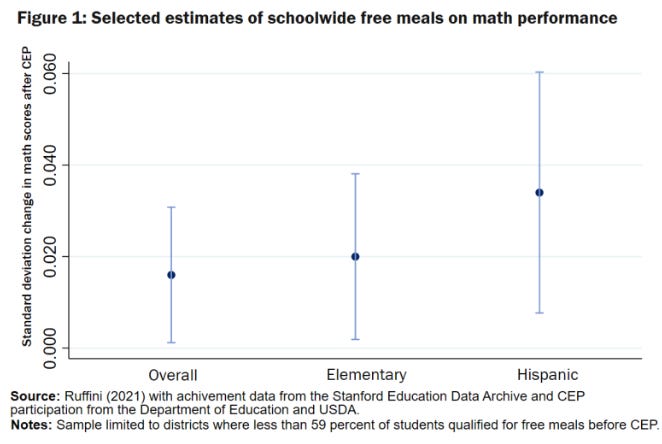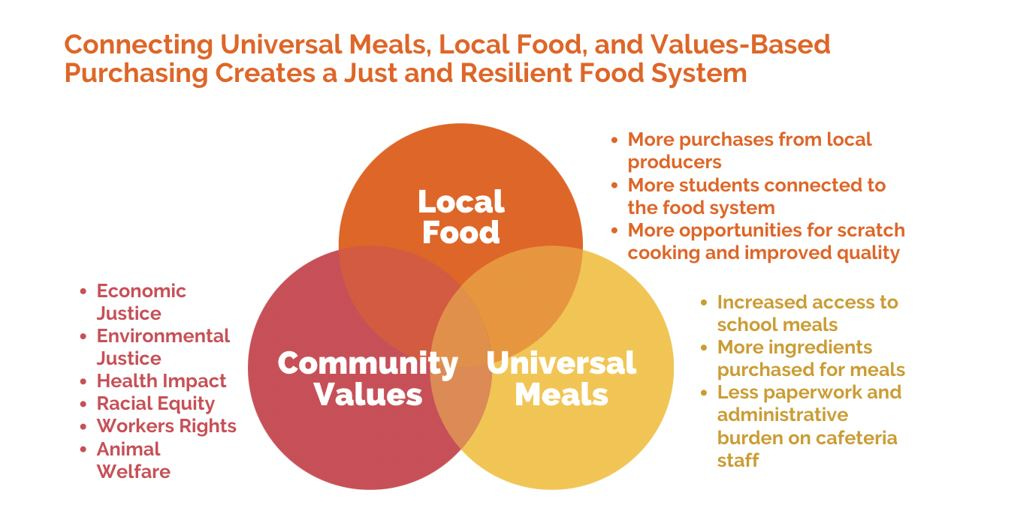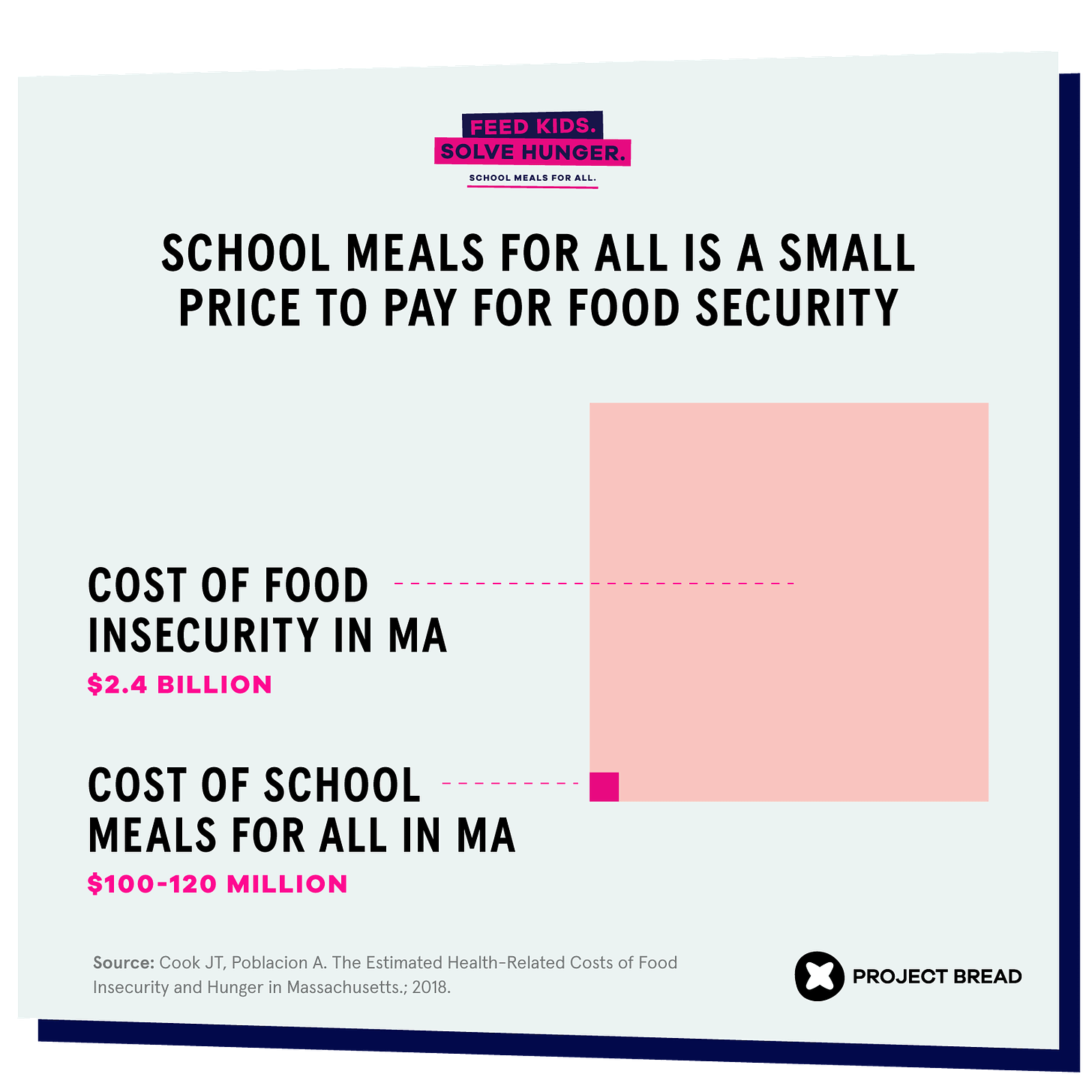The Economic And Social Case For Universal Free School Meals In Texas
Addressing hunger, health, education, and the economy with a single policy.
If you’re new here, hyperlinks lead to sources.
In Minnesota, Governor Tim Walz signed a bill that gave children universal free school meals. Since this has been a hot topic recently, I thought it an excellent opportunity to examine this public policy, the data backing it up, and why Texas should also adopt universal free meals for students.
Other states, including California, Colorado, Maine, Massachusetts, Michigan, New Mexico, and Vermont, have adopted this policy in addition to Governor Walz’s state of Minnesota.
Before we discuss this policy’s key points and how it can benefit children, families, and the economy, we must address the elephant in the room.
Universal free meals for public school children is NOT socialism.
It’s essential to understand why a program like this is not socialism because Republicans accuse any programs that help people or children in poverty of being “Socialism Communist Democrat programs.” While we on the left understand that those are different words with different meanings, none of which fit universal free meals, the right erroneously believes that they are all the same and involve any anti-poverty measures.
Socialism is when the government takes control of the means of production. These programs do not involve the government seizing control of food production, farms, or food service companies. Socialism, at its core, is an economic system in which the state owns and controls the production and distribution of goods and services.
Universal free lunch programs are simply a public service funded by taxpayer dollars that ensures all children have access to nutritious meals at school. The government contracts with private companies or uses existing school resources to provide meals.
The critical difference is that the government is not taking over the entire food industry or redistributing wealth in a way that would classify the program as socialist. It’s a targeted initiative to address a specific need, much like public education or public health programs, which exist in many countries with various economic systems, including capitalist ones.
So, while the government provides the funding and infrastructure for universal free lunches, it does not own or control the entire food production process, a crucial distinction from socialism.
Universal free meals increase student academic achievements.
A 2024 study revealed that Texas is one of the worst in the nation for the hunger crisis. The rate of child food insecurity surged to 20.8%, which is one out of every five children.
Elementary and Hispanic students experience the largest academic improvements when they are given access to universal free meals.

According to a systematic review that evaluated multiple studies on universal free school meals, there is strong evidence that these programs are associated with positive outcomes in academic achievement. Specifically, the review found that students with access to universal free meals exhibited better diet quality, leading to improved cognitive function and higher test scores. Strong nutrition standards in these meals are crucial, as they ensure that children receive the necessary nutrients to support their learning and development.
Of all of the benefits of a universal free meal program, improving academic performance is one avenue Texas should focus on, considering:
In June 2024, only 41% of Texas students demonstrated an adequate understanding of math on their STAAR tests, a decline from previous years.
Only 26% of 5th graders met science grade-level standards, a 21 percentage point decline from 2019.
In August 2023, about half of Texas students were below grade level in reading on their STAAR tests.
Healthy school meals, like teachers, classrooms, and books, are essential to the school environment and set kids up for success and better health.
Providing universal free meals led to better school attendance.
In 2021–2022, 26% of Texas students were considered chronically absent when they missed at least 10% of the school year or about 18 days. This is an increase from 11% in 2018–2019 and 15% in 2019–2020. Some factors contributing to chronic absenteeism include illness, lack of transportation, personal issues, and international travel restrictions.
When school funding is based on attendance and not enrollment, countless schools are harmed by having a quarter of their students chronically absent. The funding model for attendance vs. enrollment is a different conversation that we’ll save for another day, but the funding model for Texas schools is inadequate and should be changed.
A 2023 study from Syracuse University found that Kindergarten attendance increased by 1.8 days per school year, and chronic absenteeism dropped by 5.4 percentage points among those getting free school meals compared to those who did not.
Universal free school meals can improve children’s health and nutrition.
Did you know that Texas is among the worst states for childhood health? Our youth obesity rate is 21.5%, and Texas ranks 48th in overall child health.
Economists estimate that free or reduced-price school lunches can reduce obesity rates by at least 17%.
Students from low-income households who rely on free meals have healthier diets than those who don’t.
Universal free meals can reduce poor health in children by at least 29%.
Given that Texas ranks near the bottom in overall child health, addressing nutritional deficiencies through school meals would be crucial in reversing these alarming trends.
When strong nutrition standards are in place, these meals include more fruits, vegetables, whole grains, and other essential nutrients that children might not consistently receive at home. This is particularly important for students from low-income households, who are more likely to experience food insecurity and lack access to healthy meals outside of school.
Universal school meals help working families save money and become healthier.
The average Texas family spends $1,144 per month on groceries. Food insecurity indicates that someone cannot secure enough food for a nutritious diet, which can lead to skipping meals or cutting back on food. Food insecurity rises as more households struggle to pay their typical bills amid grocery costs surging 20% in two years.
One study found that access to universal free school meals had a meaningful impact on grocery spending for households with children, with monthly food purchases declining by about 5%.
Research has estimated that eating a healthy diet costs about $1.50 more per day than a less healthy diet. For that reason, when families save money by spending less on groceries, the savings may result in changes to the quality of their households’ diet.
When households save money from this program, they can reallocate their spending toward purchasing healthier food. Researchers found that low-income households buy groceries that are 3% healthier after the program becomes available.
Universal free school meals have several benefits for the local economy.
The return on investing in universal school meals is clear. According to a 2023 study, universal free school meals have 2.5 to seven times the return on human health and economic benefits in comparable high-income countries.
A 2022 Swedish study found that students exposed to a school lunch program throughout primary school had three percent higher lifetime earnings than students who did not participate due to improved nutritional health and education outcomes.

The Rockefeller Foundation and the Center for Good Food Purchasing released an analysis of school meal programs in the US. They found that every dollar invested in US school meal programs provides $2 in health and economic equity benefits.
Lacking access to quality, affordable, and nutritious food hurts both people and our economy. These include mental health issues, diabetes, obesity, and impaired cognitive development in children. These are avoidable expenses.
Implementing School Meals for All in Massachusetts required $100-120 million annually, an investment that pays dividends in improved health and education outcomes. The financial savings of School Meals for All are felt in their state budget and our schools and families.

Universal free meals benefit students and families and have a ripple effect that boosts local businesses and the economy. By investing in universal school meals, Texas would be making a strategic economic decision that can yield significant returns.
The demand for nutritious, locally sourced food to supply these school meal programs can create new opportunities for Texas farmers and food producers. This increased demand for local produce and goods can help sustain and grow Texas’ agricultural sector, leading to job creation and economic stability in rural areas. The emphasis on locally sourced ingredients also fosters sustainability and environmental stewardship, benefiting the state.
The long-term economic benefits of universal free school meals cannot be overlooked.
Healthier children are more likely to grow into healthier adults, reducing future healthcare costs related to diet-related diseases such as obesity, diabetes, and heart disease. As healthier students perform better academically, they are more likely to pursue higher education and secure well-paying jobs, contributing to a more educated and prosperous workforce in Texas. This leads to a cycle of economic improvement that benefits the entire state.
Investing in universal free meals also has the potential to reduce the burden on social services. By addressing food insecurity and improving public health, the state can save on costs associated with emergency food assistance programs, healthcare services, and other social safety nets.
Universal free meals are not just a social good but an economic imperative.
If this is a program we want to see in our state, we have to vote out the Republicans in Austin.
Republicans in the Texas Legislature will never support a universal free meals program. The GOP prioritizes reducing government spending and limiting the size of government. A universal free meals program would require significant public funding; despite the return and benefits to the economy, the right doesn’t look at policy in terms of cause and effect.
Republicans will argue that these programs lead to increased taxes or government debt. They’ll advocate for personal responsibility and limited government intervention in individuals’ lives. I can tell you right now that they would say it’s the responsibility of parents, not the government, to provide for their children’s meals.
It doesn’t matter that a program like this would have countless economic benefits, improve children’s academic performance and attendance, and lead to a healthier population. Republicans think that broad government programs like universal free meals can create dependency on the state. They would call it “big government” and vote against it, no matter what the data says.
Further reading:
The case for universal free meals in Texas is compelling.
The benefits are clear: improved academic performance, better attendance, enhanced health and nutrition, financial relief for families, and a boost to the local economy. These are not just theoretical outcomes; extensive research and real-world examples from other states and countries support them.
The reality is that achieving a universal free meal program for students in Texas will require significant political change.
The current Republican leadership in Austin is unlikely to support such a program due to its commitment to reducing government spending and limiting government intervention. However, this shortsighted approach ignores the long-term economic and social benefits that universal free meals would bring to our state.
If we want to see a healthier, more educated, and economically prosperous Texas, we must advocate for leaders who prioritize the well-being of all Texans, especially our children. This means voting for candidates who understand the importance of investing in our future through programs like universal free meals. It’s time to demand better for our children, families, and state.
Vote early, vote often, just vote.
August 19: Last day for write-in candidates to declare their candidacy.
October 7: Last day to register to vote.
October 21: First day to early vote.
October 25: Last day to apply for a mail-in ballot.
November 1: Last day to early vote.
November 5: Election day!
LoneStarLeft’s Newsletter is a reader-supported publication. To receive new posts and support my work, consider becoming a free or paid subscriber.
Follow me on Facebook, Twitter, TikTok, Threads, YouTube, and Instagram.





You do an incredible job...Thanks Michelle.
Excellent, informative article.